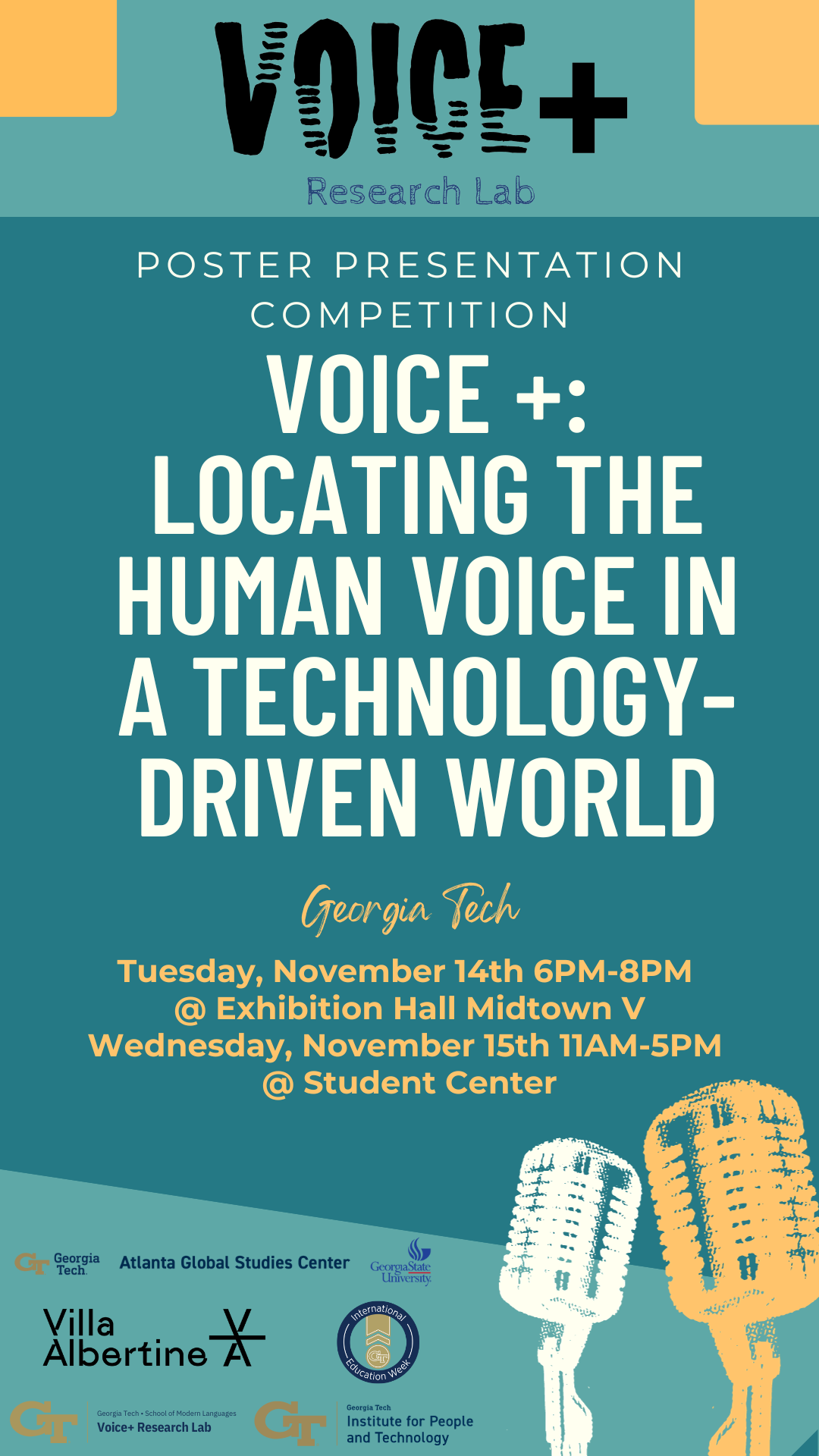What is the Voice+ Research Lab?
Housed in the School of Modern Languages, thanks to support from the Atlanta Global Studies Center and the IPaT/GVU Research and Engagement Grants, Villa Albertine and International Education Week, the Voice + Research Lab is an Interdisciplinary Voice Studies Lab that explores the human voice from a variety of perspectives and integrates knowledge and methodologies from different disciplines. It encompasses a wide range of topics related to the voice, including vocal production, vocal health, cultural and historical aspects of vocal expression, and the artistic and expressive use of the voice. Interdisciplinary voice studies aim to provide a holistic understanding of the voice and its multifaceted aspects, fostering collaboration among experts in various fields to explore sound and structures of the human voice. Interdisciplinary voice studies often draw on the expertise of scholars and practitioners from fields such as, but not limited to:
Voice+ Research Lab
Blurb / Gallery Set
Music
focusing on vocal techniques, music theory, and the study of vocal performance in various musical genres
Technology
technological advances have also played a role in interdisciplinary voice studies, with research on voice synthesis, speech recognition, and voice analysis
Business and Marketing
from Voice-activated virtual assistants to sonic branding and voice advertising, voice is an integral part of marketing strategies
Speech and Communication
study of speech, phonetics, and vocal communication, public speaking,
acting, and other communication contexts
Linguistics
studying language differences, the variations in vocal sounds across cultures, and the role of the voice in language evolution
Medicine and Health Sciences
research in this area explores vocal health, voice disorders, and the medical aspects of vocal production
Cultural Studies
considers how the voice is used within cultural and social contexts, including its role in identity, gender, and societal norms
Theatre and Performance Studies
looks at the expressive use of the voice in acting, theater, and performance art, as well as the historical and cultural significance of vocal performance
Psychology
including the emotional impact of vocal expression, the perception of voice, and the psychological aspects of vocal training and therapy
Voice+ Speaker Series
Dr. J. Martin Daughtry
Monday, October 28, 2024 | 3:30pm| In-person or via Zoom
Gilbert Price Memorial Library, Scholar's Event Theatre (1280)
"Panvocalism: Atmospheric Transcripts from the End of the World"
From the standpoint of the earth's atmosphere, a human voice is little more than a puff of air rejoining the greater atmospheric body after a period of temporary confinement in a writhing tube of flesh. What, if anything, separates this puff from other atmospheric emissions? What is the expressive content of a human sigh, a car's exhaust, a methane leak, a blast of war dust?
Dr. Daughtry, Associate Professor of Ethnomusicology at NYU, is author of Listening to War: Sound, Music, Trauma, and Survival in Wartime Iraq (Oxford UP, 2015). His work draws from ethnomusicology, sound studies, the anthropology of the senses, and the ethnographic study of violence. He is the author of Listening to War: Sound, Music, Trauma, and Survival in Wartime Iraq (Oxford, 2015). His longstanding research projects—on the sonic dimension of modern warfare, Soviet and post-Soviet musical practices, music in the post-9/11 world, the dynamics of the auditory imagination, and the multifaceted significance of human and nonhuman vocality—all explore the capacities and limits of sonic cultures in a complex world of often-violent change.
Dr. Daughtry's current book project, On Voice and Air: Precarious Songs of the Anthropocene, draws upon his longstanding interest in vocality, but it treats the voice less as a meaning-saturated sound that humans make, and more as a form of consequential gaseous exchange that involves humans, nonhuman creatures, machines, and geological processes. Human voice involves sound, but it also involves a billowing of air from your body that creates a state of co-vulnerability between you and those near you. You inhale, and tiny particulates from cars and power plants and nuclear tests enter your body. You sing out, and a microbial swarm is released. Voices express thoughts, but they also “express” particulate matter into the atmosphere. As such, voices are tied into cultural and environmental processes. Gaseous emissions tell stories, whether they are coming from our mouths or our livestock or our car exhausts or our landfills. In this book, Daughtry tries to relate some of these stories—stories told by human and nonhuman voices, stories told in sound and beyond sound, stories about intimate encounters, and about the end of the world.
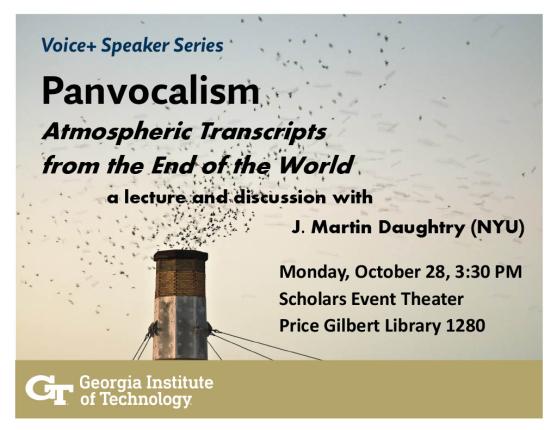
Dr. Matthew Rahaim
Thursday, March 28, 2024 | 4:00-5:30 pm
Gilbert Price Memorial Library, Scholar's Event Theatre (1280)
Dr. Matthew Rahaim is a composer, improviser, scholar, and vocalist, grounded in the Gwalior lineage of Hindustani music. His work includes analog synthesis, voice, raga, event scores, gestural instruments, and electroacoustic compositions. Recent compositions have been featured at the Wakpa Triennial, Drone Not Drones, and The Great Beyond festival. His current project, Improvising Relationality, experiments with ways of being both together and apart, in empathic intimacy and vulnerable alterity, exploring the relational play of mutual dependence and mutual freedom.
Matt's ethnomusicological work focuses on Hindustani music, practices of listening, methexis, and the mysteries of voice. His first book, Musicking Bodies: Gesture and Voice in Hindustani Music, dealt with the tacit bodily disciplines passed down through generations of Hindustani vocalists. His new book, Ways of Voice: Vocal Striving and Moral Contestation in North India and Beyond, investigates various traditions of voice production and vocal change in the Hindustani vocal ecumene.
There will also be an Event Workshop preceding the talk. This will be a workshop on relational improvisation guided by event scores, open to all. No musical training or any other preparation is required. Complete beginners are welcome. Everything you need will be provided. Click here for more!
March 28th 2024, 2-3:15 | West Village Dining Commons 163
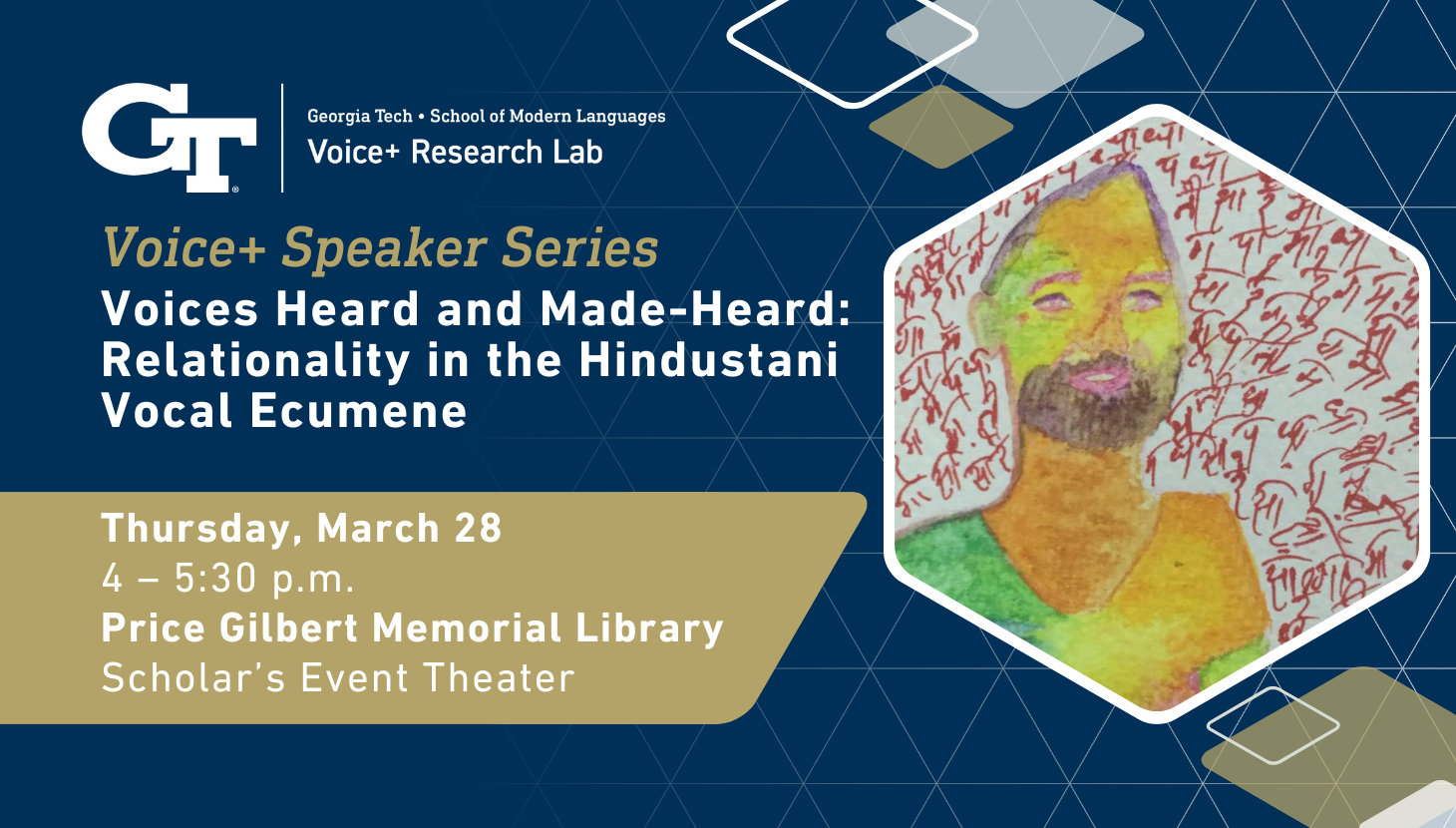
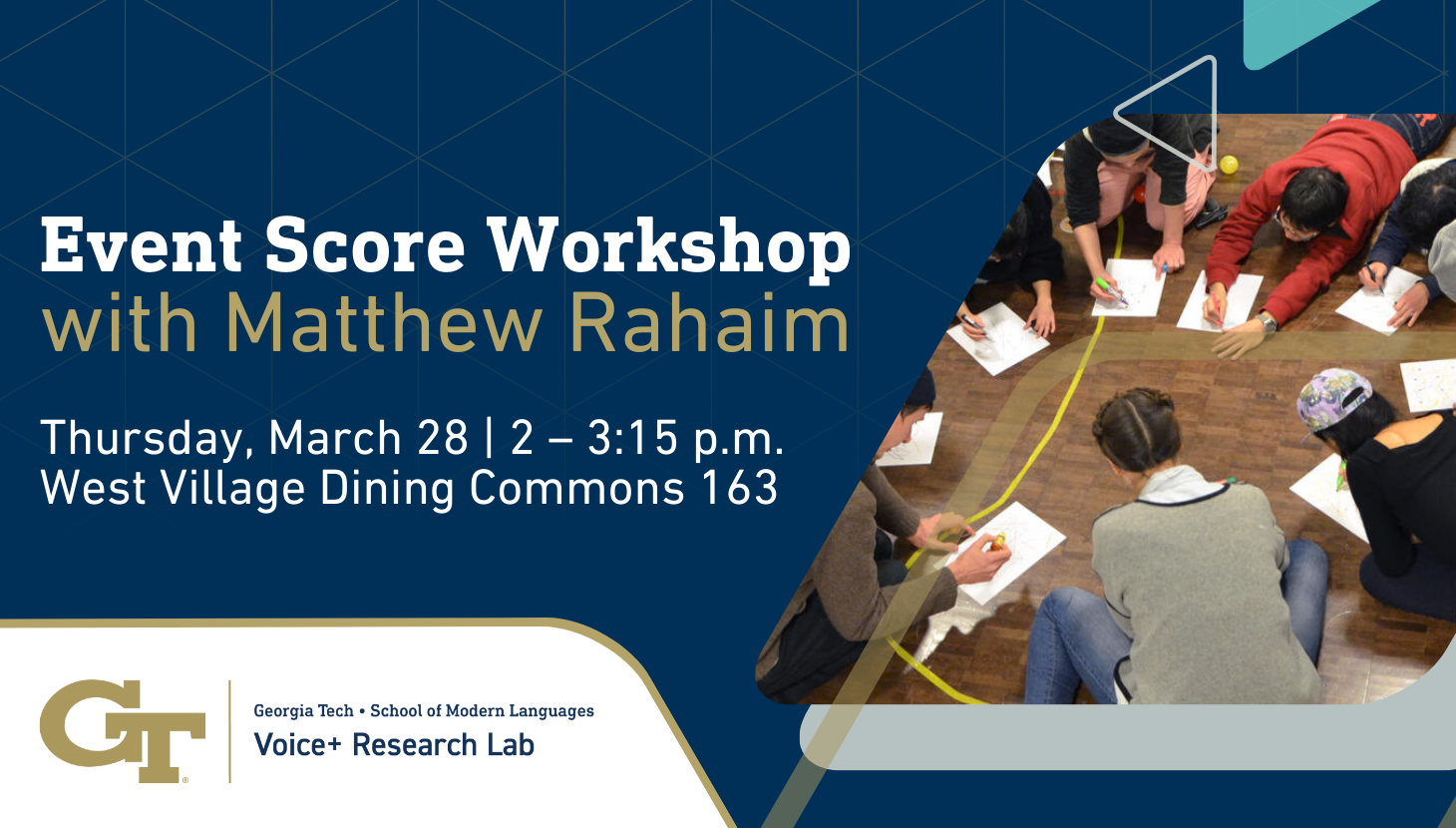
Kat Mustatea
Wednesday, March 6, 2024 | 3:30-5:00 pm
Gilbert Price Memorial Library, Scholar's Event Theatre (1280)
Kat Mustatea, one of the finalists for the Guthman Musical Instrument Competition that will be held next week at the Ferst Center (March 9, 7 pm). She will be presenting her work and her musical instrument BodyMouth, a sound-movement instrument that makes use of real-time speech synthesis in live performance to enable speaking through physical movement. Wearing sensors on their body, a performer sounds out words, phoneme by phoneme, by enacting specific gestures in sequence—literally, turning the body into a mouth that speaks.
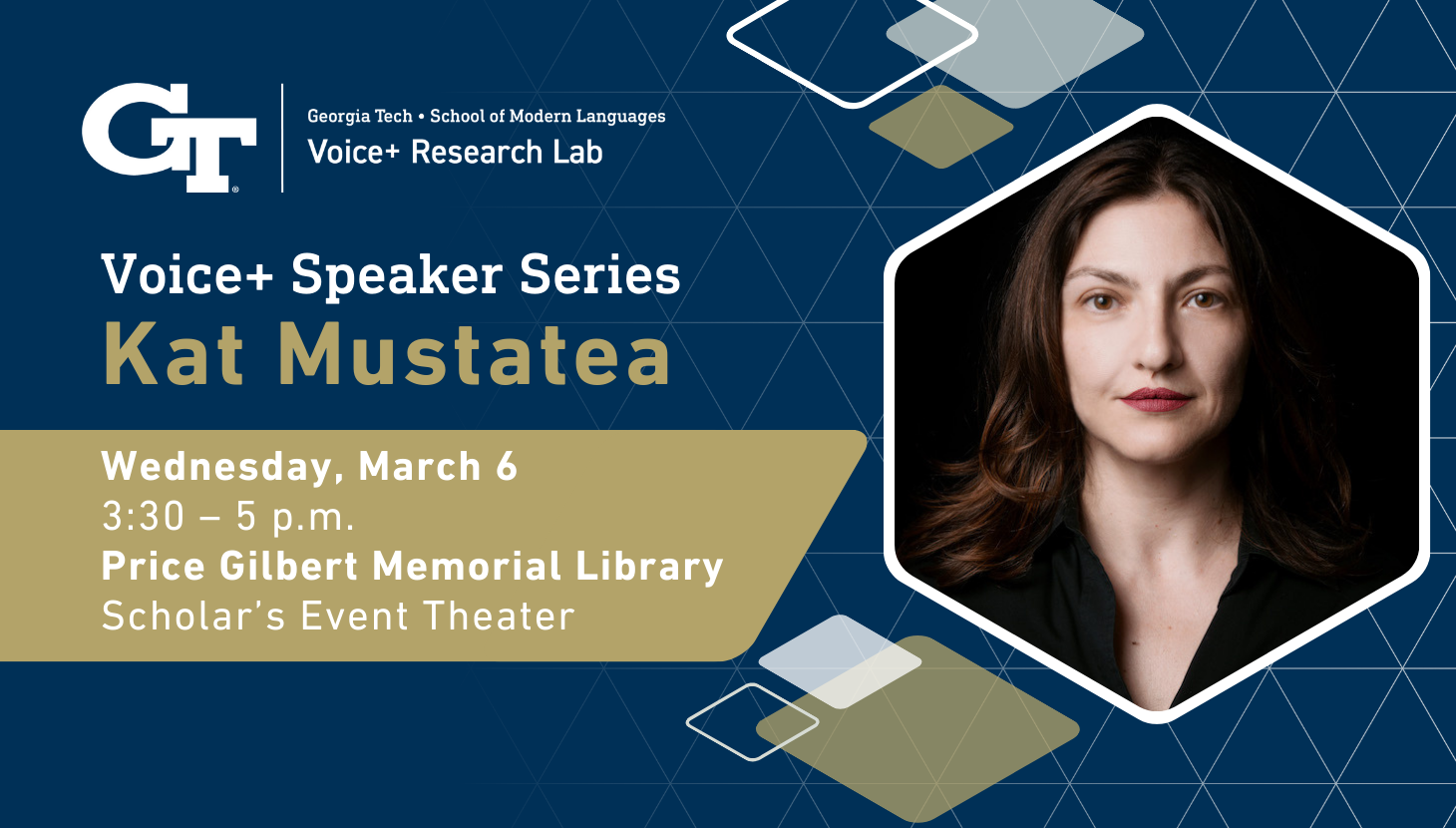
Voice+ Student Research Symposium - Call for Proposals
We are pleased to invite proposals for poster presentations for The Voice+ Research Lab at Georgia Tech’s inaugural student research symposium on November 14-15, 2023. We are seeking proposals for undergraduate and M.S.- level research poster presentations that engage with the intersections between voice and technology. We suggest that students build on a topic they have worked on in coursework and present their findings at the Voice+ Symposium. What students choose to present on should be to pursue a question that aligns with their interests, expertise, and areas of specialization.
There will be prizes awarded to the top three presenters.
Contact Dr. Andrea Jonsson: Ajonsson7@gatech.edu
Examples of possible lines of inquiry for the Poster Presentation Competition:
- How does an analysis of voice in a text, film, medium enhance our understanding of the work/author/argument?
- How can voice recognition software be improved to better understand and respond to diverse voices?
- What acoustic features are most important for speech and speaker recognition systems?
- How can voice synthesis technology be used to create more authentic human-sounding voices?
- How does technology aid in voice rehabilitation or therapy?
- How do cultural norms shape how we “hear” voice in different societies, genders or ethnicities?
- How do sociopolitical or historical factors influence vocal expression?
- How do regional accents and dialects affect our perceptions of authority, education, culture?
- What is the role of intonation in conveying meaning and emotions?
- How do gender and age influence pitch, cadence, or resonance patterns in communication?
- How do vocal qualities influence persuasion and effectiveness in public speaking?
- What roles do nonverbal communication play in interpersonal relationships and conflict resolution?
- How can interdisciplinary approaches influence vocal training for singers or actors?
Voice+ Technology - Inaugural Event
Voice+: Locating the Human Voice in a Technology Driven World
November 14, 2023 | 6:00 - 8:00 pm
Exhibition Hall Midtown V
Performance and Q&A with DJ Deena Abdelwahed
A Tunisian producer and DJ, Deena Abdelwahed has released a number of albums on the InFiné label in Paris, including “Khonnar” (2018) and “Dhakar” (2020). Her musical explorations strive to reinterpret the diverse elements that comprise Arab music, drawing inspiration from both club music and the current experimental music scene. She has performed live and DJ sets at various festivals, including Sonar in Spain, Berlin’s CTM, Mexico City’s Mutek, and clubs such as Concrete Paris, Berlin’s Berghain and Moscow’s Mutabor. (https://villa-albertine.org/residents/deena-abdelwahed/)
November 15, 2023 | 11:00 am - 4:30 pm
11 am - 12:30 pm | Poster Presentations | Student Center Piedmont Room
Students invited to present their interdisicplinary research posters for a competition—more information to follow
12:30 - 1:30 pm | Catered Lunch | Student Center Piedmont Room
3:00 - 4:30 pm | Renée Altergott Research Presentation | Student Center Northside Room
“Reading Against the Grain of the Voice: Flaubert’s Madame Bovary”
Dr. Renée Altergott is a Visiting Assistant Professor of French at Wabash College (Indiana). She completed her PhD in French and Francophone Literature at Princeton University. Her work examines the cultural and literary history of sound recording in France and the former French Colonial Empire. Recent publications on sound, technology, and colonialism have appeared in Nineteenth-Century French Studies, French Forum, and Contemporary French Civilization Intersections.
